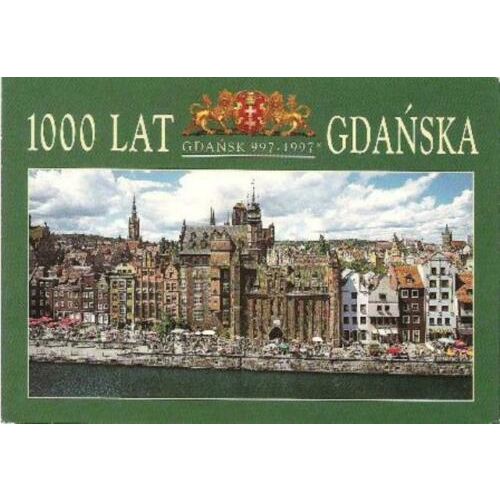Gdansk, Poland - Millennium - Dlugie Pobrzeze - postcard, stamp 1997
- Condition : Used
- Dispatch : 2 Days
- Brand : None
- ID# : 189638677
- Quantity : 1 item
- Views : 155
- Location : United Kingdom

- Seller : justthebook (+1704)
- Barcode : None
- Start : Thu 27 Feb 2020 16:12:17 (EDT)
- Close : Run Until Sold
- Remain : Run Until Sold
Checks/Cheques
 for 1 item(s) edit
for 1 item(s) edit
Shipping Calculator
More Listings from This Seller view all
Seller's Description
- Postcard
- Picture / Image: "1000 Lat Gdanskka (997-1997)"
- Publisher: yes
- Postally used: yes
- Stamp: Pan Dragon, Gdansk
- Postmark(s): 1997?
- Sent to: Chorley Wood, Herts., England
- Notes / condition:
Please ask if you need any other information and I will do the best I can to answer.
Image may be low res for illustrative purposes - if you need a higher definition image then please contact me and I may be able to send one. No cards have been trimmed (unless stated).
------------------------------------------------
Postage & Packing:
Postage and packing charge should be showing for your location (contact if not sure).
No additional charges for more than one postcard. You can buy as many postcards from me as you like and you will just pay the fee above once. Please wait for combined invoice. (If buying postcards with other things such as books, please contact or wait for invoice before paying).
Payment Methods:
UK - PayPal, Cheque (from UK bank) or postal order
Outside UK: PayPal ONLY (unless otherwise stated) please. NO non-UK currency checks or money orders (sorry).
NOTE: All postcards are sent in brand new stiffened envelopes which I have bought for the task. These are specially made to protect postcards and you may be able to re-use them. In addition there are other costs to sending so the above charge is not just for the stamp!
I will give a full refund if you are not fully satisfied with the postcard.
----------------------------------------------
Text from the free encyclopedia WIKIPEDIA may appear below to give a little background information (internal links may not work) :
*************
Gdańsk (/ɡəˈdænsk/, also US: /ɡəˈdɑːnsk/,[2] Polish: [ɡdaj̃sk] (About this soundlisten); Kashubian: Gduńsk; German: Danzig [ˈdantsɪç] (About this soundlisten)) is a Polish city on the Baltic coast. With a population of 466,631,[1] Gdańsk is the capital and largest city of the Pomeranian Voivodeship and one of the most prominent cities within the cultural and geographical region of Kashubia. It is Poland's principal seaport and the centre of the country's fourth-largest metropolitan area.[3]
The city is located on the southern edge of Gdańsk Bay (of the Baltic Sea), in a conurbation with the city of Gdynia, spa town of Sopot, and suburban communities, which together form a metropolitan area called the Tricity (Trójmiasto), with a population approaching 1.4 million.
Gdańsk is the capital of Gdańsk Pomerania and the largest city of north Poland. The city's history is complex, with periods of Polish rule, periods of Prussian or German rule, and periods of autonomy or self-rule as a "free city". In the early-modern age Gdańsk was a royal city of Poland. It was considered the wealthiest and the largest city of Poland, prior to the 18th century rapid growth of Warsaw. Between the world wars, the Free City of Danzig, having a German majority, was in a customs union with Poland and was situated between East Prussia and the so-called Polish Corridor.
Gdańsk lies at the mouth of the Motława River, connected to the Leniwka, a branch in the delta of the nearby Vistula River, which drains 60 percent of Poland and connects Gdańsk with the Polish capital, Warsaw. Together with the nearby port of Gdynia, Gdańsk is also a notable industrial center. In the late Middle Ages it was an important seaport and shipbuilding town and, in the 14th and 15th centuries, a member of the Hanseatic League.
In the interwar period, owing to its multi-ethnic make-up and history, Gdańsk lay in a disputed region between Poland and the Weimar Republic, which later became Nazi Germany. The city's ambiguous political status was exploited, furthering tension between the two countries, which would ultimately culminate in the Invasion of Poland and the first clash of the Second World War just outside the city limits, followed by the flight and expulsion of the majority of the previous population in 1945. In the 1980s it would become the birthplace of the Solidarity movement, which played a major role in bringing an end to Communist rule in Poland and helped precipitate the collapse of the Eastern Bloc, the fall of the Berlin Wall and the dissolution of the Soviet Union.
Gdańsk is home to the University of Gdańsk, Gdańsk University of Technology, the National Museum, the Gdańsk Shakespeare Theatre, the Museum of the Second World War, Polish Baltic Philharmonic and the European Solidarity Centre. The city also hosts St. Dominic's Fair, which dates back to 1260, and is regarded as one of the biggest trade and cultural events in Europe.[4]
Listing Information
| Listing Type | Gallery Listing |
| Listing ID# | 189638677 |
| Start Time | Thu 27 Feb 2020 16:12:17 (EDT) |
| Close Time | Run Until Sold |
| Starting Bid | Fixed Price (no bidding) |
| Item Condition | Used |
| Bids | 0 |
| Views | 155 |
| Dispatch Time | 2 Days |
| Quantity | 1 |
| Location | United Kingdom |
| Auto Extend | No |




















